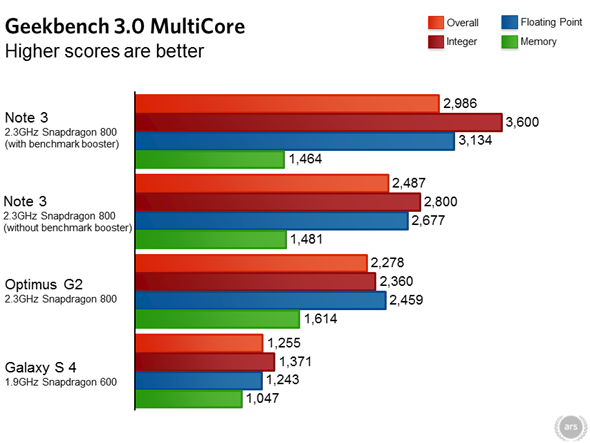As soon as a new mobile device hits the market and even before, statisticians keenly run the hardware through a series of benchmark tests, which offer a fairly accurate idea of the general overall performance. In the past, we’ve seen evidence of Samsung rigging the International Galaxy S4’s GPU to perform better when running these apps, and now, the folks of Ars Technica have concluded beyond doubt that the Korean company has been up to its tricks again with the Galaxy Note 3.
Having run through the usual benchmark tests, Ars’s Ron Amadeo found that, strangely, the Note 3 was considerably out-performing its peers with suspiciously high numbers. In fact, having stood it up against the LG G2 phablet, which runs the very same Qualcomm 2.3GHz Snapdragon 800 as the third Note, it was clear that something was afoot, and after what has been described as "a good bit of sleuthing," it is clear that the U.S. Galaxy Note 3 has been rigged to offer artificially-high benchmark scores.

When the device detects that one of a number of benchmark apps are running, the device runs a "high-power CPU mode" that, in turn, leaves particularly generous numbers when the scores roll in.
Apple’s Phil Schiller has naturally jumped on the news, describing the "shenanigans" on his official Twitter feed, and one has to wonder why Samsung has gone to such lengths to try and stretch the truth. Surely, somebody in the "high-power CPU mode" ideas pool would have suggested that techies are not stupid, and would indeed notice ridiculously high numbers? With the likes of the G2 right there for comparison, such a tactic was never going to slide unnoticed, and now, the dishonesty will likely dissuade some from going out and making the purchase.

Ars did manage to circumvent the special power-up mode and gauge, for the first time perhaps, a true reading of the device’s benchmarks. As it transpires, the benchmark mode offers a faux 20 percent over the organic score attained, which I think you’ll agree is a pretty significant difference.
The icing on the cake is that, in actual fact, the Note 3 – sans the booster – actually comes out on top of its closest rival in the G2, so it would seem all the fakery may have been rather unnecessary.

What do you think – should Samsung be messing with the numbers in this way? Or have we, as mobile consumers, become too caught up on benchmarks?
(Source: ArsTechnica) (via: Twitter [Phil Schiller])
You can follow us on Twitter, add us to your circle on Google+ or like our Facebook page to keep yourself updated on all the latest from Microsoft, Google, Apple and the Web.

